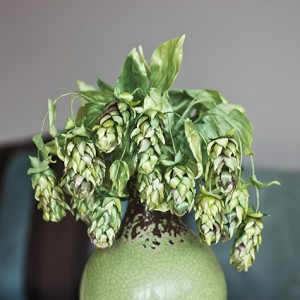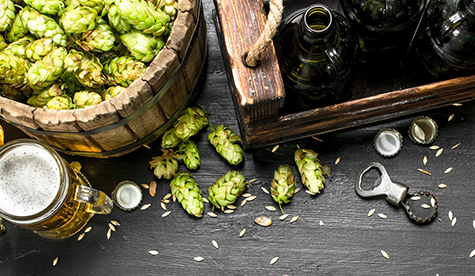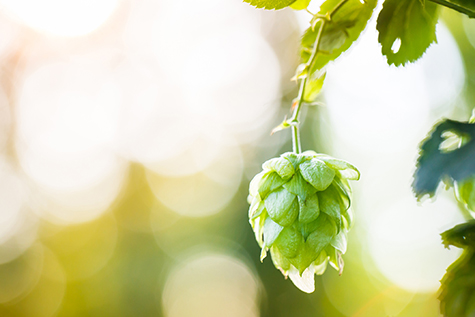Hops: For Anxiety, Sleep, and More?

When you think of hops you may think first of beer – a main reason that we grow this crop. But these climbing vines native to Eurasia and North America have a rich history of medicinal use as well. In fact, hops are related to the cannabis plant; they even have some similarities in flavor and aroma. Famous for treating sleep disorders, research on this medicinal plant continues to gain traction (outside the brewing industry!).
Medicinally, hops are used for:
- Anxiety
- Sleep disorders including insomnia
- Tension, nervousness, irritability and excitability
- Attention deficit-hyperactivity disorder (ADHD)
- To stimulate the appetite and treat indigestion
- As a diuretic
- To stimulate lactation
- Menopausal symptoms including hot flashes
There are several parts of the hops plant that are used. For brewing beer, the strobile, or cone-like structures along the stem, are used for their flavor. For medicine and health, extracts and oils are used as well. Hops are categorized as GRAS (generally recognized as safe), so when used in amounts commonly found in food, there is little worry of negative effects. There is evidence that the Romans cooked up hop shoots and served them like any other veggie; they have a rich history of culinary use. Hop leaves can be used like other herbs because of their bright, zesty flavor.
The strongest evidence on the health benefits of hops is for sleep and relaxation. Often combined with other sedatives like valerian extract, studies have shown that research subjects taking a supplement experienced improved sleep when compared to a placebo group. Sleep duration increased by up to 2.5 hours and night-time awakenings decreased by 50%. Hops even performed as well as some prescription sleep medications in some studies. Note that research on this subject isn’t yet conclusive and using hops alone without other herbs hasn’t proven a useful therapy…yet.
 There is some exciting research coming out about the use of hops to treat hot flashes related to menopause though again, studies are mixed. Compounds in hops bind to estrogen receptors which is one reason they could be useful for some women. Though hops have been used for medicine throughout human history, there is still more to learn about their use in conjunction with modern medicine. It is known that they exhibit antibacterial and anti-inflammatory effects and contain several unique antioxidants which, like so many plants, are linked to positive health effects. In particular, hops contain xanthohumol which may be one reason for health benefits in hops linked prevention of various degenerative diseases, including cancer and cardiovascular issues.
There is some exciting research coming out about the use of hops to treat hot flashes related to menopause though again, studies are mixed. Compounds in hops bind to estrogen receptors which is one reason they could be useful for some women. Though hops have been used for medicine throughout human history, there is still more to learn about their use in conjunction with modern medicine. It is known that they exhibit antibacterial and anti-inflammatory effects and contain several unique antioxidants which, like so many plants, are linked to positive health effects. In particular, hops contain xanthohumol which may be one reason for health benefits in hops linked prevention of various degenerative diseases, including cancer and cardiovascular issues.
The good news is that hops are generally well tolerated with few reported side effects. There have been some reports of dizziness or sedation which makes sense as it exhibits relaxation properties. There is a moderate potential interaction with using hops in supplement/extract form with alcohol because the depressive effects can be compounded. Similarly, use caution with hops and other central nervous system depressants or estrogen usage because it may have the ability to bind to estrogen receptors. Make sure to talk to your doctor before using to make sure hops are safe for you to use.
What do you think? Have you used hops in cooking or as a supplement to help with sleep? Let us know in the comments!
Resources
Stevens JF, Page JE. Xanthohumol and related prenylflavonoids from hops and beer: to your good health!. Phytochemistry. 2004 May 1;65(10):1317-30.
Natural Medicines Database. Hops. https://naturalmedicines.therapeuticresearch.com/databases/food,-herbs-supplements/professional.aspx?productid=856. Updated 6/1/2018. Accessed 7/18/18.

